2015 EBICS REU Introduces Undergrads to the World of Research, Graduate School
August 25, 2015
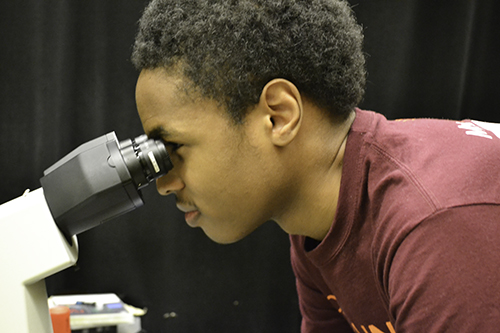
Solomon McBride uses a microscope in ECE professor Gabriel Popescu's lab in Beckman Institute.
While performing cutting-edge research at Illinois this past summer as part of the NSF-funded EBICS (Emergent Behaviors of Integrated Celllular Systems) Research Experience for Undergraduates (REU), the five students gained more than a deeper understanding of the subject they were studying; they learned time management, networked with researchers, and experienced what it's like to be graduate students.
Iin addition to doing research, during the 10-week program from May 26–July 31, 2015, the undergrads were mentored by both research professors and graduate students and received in-depth training about their subject matter. Students also developed and presented a poster about their research at the Illinois Summer Research Symposium at the I-Hotel at the end of the summer.
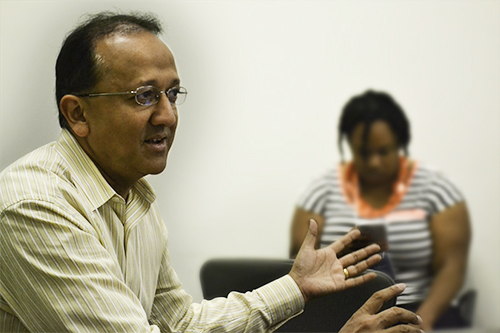
Dr. Rashid Bashir explains the program to the EBICS REU participants during the REU Orientation at the beginning of the summer.
The EBICS REU collaborated with other campus REUs to provide quality programming for the students, including joint seminars. The REU also partnered with the Summer Research Opportunities Program (SROP), which gave students practical training in how to write research papers, give a presentation, create a poster, and develop a CV or resume during evening seminars, which rising juniors and seniors found to be particularly helpful. Also helpful for the EBICS upperclassmen were some additional writing requirements; for example, students were trained in how to write a graduate research fellowship application, which, if funded, it would cover three years of grad school.
One goal the EBICS REU met was recruiting a diverse group of participants: all five (100%) participants were from underrepresented populations. Also diverse in terms of age, the group of students included two rising sophomores who had participated in Project ENGAGE in high school, under the direction of Dr. Manu Platt at Georgia Tech.
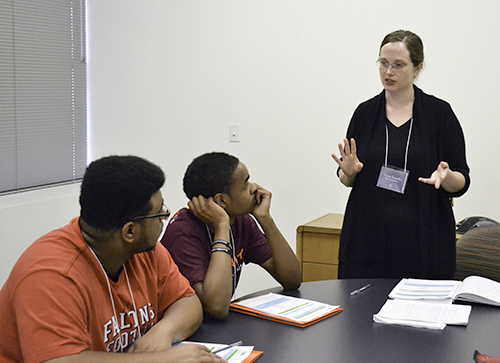
Left to right: David Alexander and Solomon McBride listen as Carrie Kouadio explains the EBICS REU components during the REU Orientation at the beginning of the summer.
According to EBICS REU Program Coordinator Carrie Kouadio, EBICS REU students put in 40–50 hour work weeks this summer, which was quite stretching for the youngest students.
“So that’s a lot for a freshmen. It’s a lot for anyone. It’s the most they’ve worked by far.” But she goes on to explain that as a result, they learned a lot of good time management skills.
“’Go for it; do it!’ I told them...'Ok, you’ve got this thing due ASAP. Cut out everything nonessential. Just focus on it. Don’t do anything extra.’ I mean, that’s how we do it as adults. And you have to learn how to do that.”
She adds that for the two rising sophomores, their fall semester would seem a breeze. “So they’re kind of learning these lessons young, which I think is the good thing about it; going into their sophomore year, that will be like a vacation compared to this summer.”
David Alexander
One student who took the lessons about time management to heart was David Alexander, a rising sophomore studying biology at Valdosta State. "I think this program actually made me more organized," he admits, "because since starting this program, I’ve actually taken the time to make a calendar. Before, I typically wouldn’t do that, but now I see the importance of keeping up with deadlines."
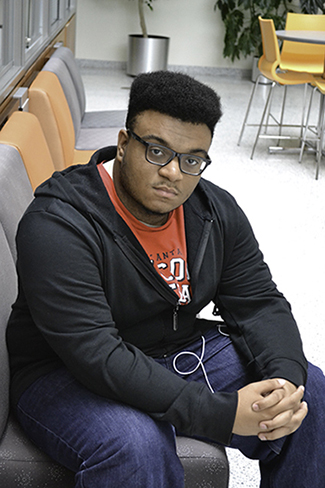
EBICS REU participant David Alexander
Alexander indicates that being in the program also helped with his networking, and he was encouraged to create a "Linked-In" account and add people from the program here. "I think it increased my networking a lot; I can go back and count on these people if I ever need them."
Alexander worked in Rashid Bashir’s lab fabricating devices made of PDMS. "PDMS, which stands for Polydimethylsiloxane," he glibly explains. "It’s a polymer." They used these devices to capture white blood cells that are a biomarker for sepsis. Although he had previously done cell culture research under Project ENGAGE, Alexander explains that this was different.
"Since I’ve been here, I’ve been fabricating devices, and I just started working with cells. So it’s been a whole new experience for me."
While the research might have taken him out of his comfort zone, he indicates that this summer definitely broadened his understanding of what research is:
"I was just thinking research was hands-on with cells, but since I’ve been working here, it’s not completely that; it’s opened my eyes. It pushed me even more towards going on and getting my PhD."
Ironically, his favorite thing this summer was making the PDMS devices, "because it was a whole new experience for me," he explains. "And it was like cooking in a way; you just had to follow the protocol. It was like baking a cake.”
And after “baking” the PDMS devices, he had another new experience: he got to go to Carle Hospital to help conduct trials with those devices.
Solomon McBride
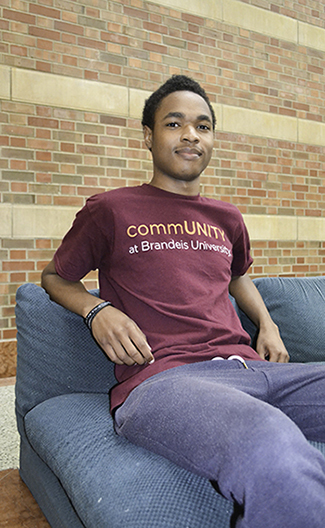
EBICS REU participant Solomon McBride
Like Alexander, rising sophomore Solomon McBride also appreciated the networking. Majoring in both biomedical research and computer science at Brandeis University, McBride reports that the mentoring relationships impacted him significantly.
"It’s just a great opportunity to further the skill and techniques, to work in a lab, meet people who work in labs who can talk to you, give you knowledge, give you insight. It kind of transcends just working in a lab; you’re actually working with people who do this on a daily basis, so you get experience working with the techniques and you get experience from the people who are doing those techniques."
Solomon indicates that along with knowledge and techniques, his mentors also transferred some of their zeal to him: "The excitement they have, the passion they have—it’s so crazy how that can just carry on to you, make you instantly more excited, more passionate about what you’re doing, and you just put more effort toward it."
And it appears that they successfully imparted to Solomon their passion for understanding how cells grow:
"Cell growth is the basis for a lot of diseases—cancer, HIV," he explains. "Cell growth is a hallmark of a lot of diseases. If we can understand, if we can regulate, if we can try to see how that happens, a lot of treatments can become a lot more specified. Physicians can have a lot more knowledge about the stage of where the disease is; it can make the treatments a lot more specific for patients if they can really understand how cells are growing."
McBride definitely sees grad school and a Ph.D. in his future. His dream job? To be the head of his own lab some day, having the same kind of impact on young people that his mentors have had on him.
“Dr. Platt (his Project ENGAGE professor at Georgia Tech) influenced me so much to just get into the science field; Dr. Popescu, he’s influenced me so much, showing me how these two fields are intertwined. I’d just love to have an impact like that on somebody like my professors had on me. Meet a kid, be nice to him, help him, guide him to science like I feel I was guided."
Stephanie Schramm
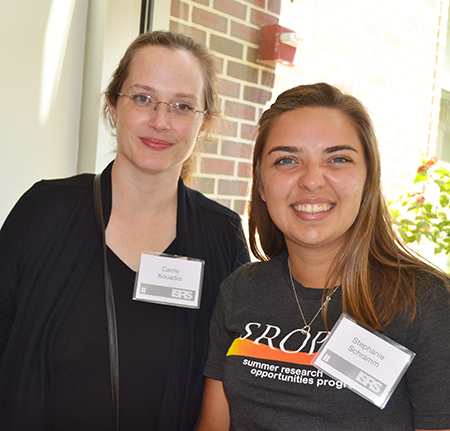
EBICS REU Program Coordinator Carrie Kouadio and REU participant Stephanie Schramm
It wasn't just the younger students who gained clarification on their future careers. For example, Stephanie Schramm, a rising senior in Biological Engineering at Purdue University, indicated that the experience this summer helped her decide that she definitely wants a career in research:
“I’m really glad I did this summer, because I’m hoping to pursue research now. I always thought I wanted to, but this just confirmed that I’m definitely interested in it.”
However, Schramm hasn’t necessarily settled on what field. “I want to do research with food, water, or energy, or a combination of a few. I need to narrow it down a little more, so we’ll see where that takes me.”
What the experience did help her realize is that research is a lengthy, involved process: “So how many different people are involved, especially with EBICS doing the cross-university work, so seeing how the collaborations work.”
What else did Schramm discover? Research can take some time...possibly a lifetime: “When I came into college, I was like, ‘I can’t wait to make a difference and big changes,’ and now realizing how long it takes for those big changes to happen. So it put me in that mindset of: ‘Okay, I’m going to help get towards changes, but I’m probably not going to find the cure for energy issues in my lifetime.’ So it helped really see the bigger picture of what graduate school is about, and academia, and industry, and all that.”
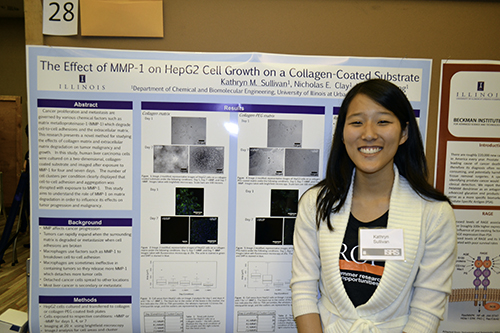
Kathryn Sullivan presents her research poster during the Illinois Summer Research Symposium
Catherine Sullivan
Like Schramm, rising senior Catherine Sullivan, a double major in Materials Science Engineering and Biomedical Engineering at Carnegie Mellon University, especially appreciated the exposure to what grad school is going to be like: “I think research is a great opportunity for undergraduate students who are interested in pursuing a PhD to get hands-on experience in the lab and understand more of the dynamics of what happens in graduate school.”
What did Sullivan learn this summer? “The results of my research were important for understanding how in vitro testing for drug cancer therapies need to take into consideration the geometry of the system,” she explains. In layman’s terms, a 3-D system is better than a 2-D system because it more closely mimics the human body.
Sullivan, who hopes to get a PhD in either Bioengineering or Biomedical Engineering and to continue in cancer research, claims that her research experience was invaluable: “So this opportunity was actually perfect for me, because it allowed me to get that lab experience I needed, understand more of what actually goes on in graduate-level research, and also to have papers that I’ll be published on to help me get into PhD schools.”
Author/Photographer: Elizabeth Innes, Communications Specialist, I-STEM Education Initiative
More: EBICS, REU, REU: EBICS, Summer Research, Undergrad, Underserved Minorities, 2015
For additional istem articles about summer 2015 REUs, see:
- REU Undergrads Experience Research, What Graduate School Is Like
- Summer Research Experience Exposes Undergrads to Bioimaging at Illinois
- nano@illinois REU Undergrads Experience Growth Via Nanotechnology Research
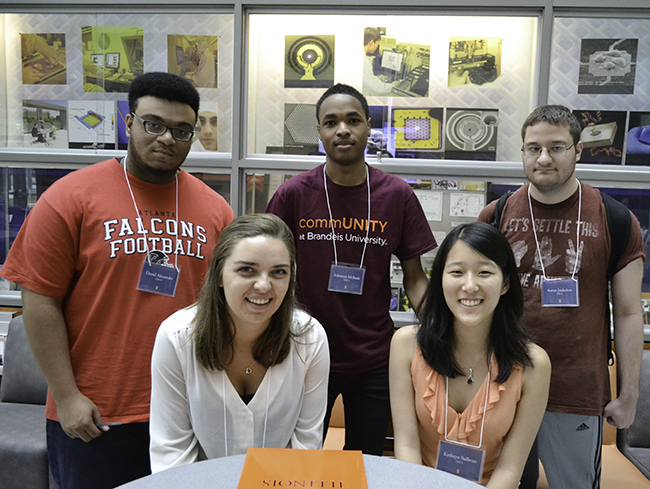
Summer 2015 EBICS REU participants (clockwise from left): David Alexander, Solomon McBride, AaronJankelow, Catherine Sullivan, and Stephanie Schramm













.jpg)
















